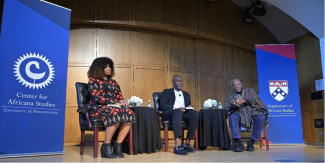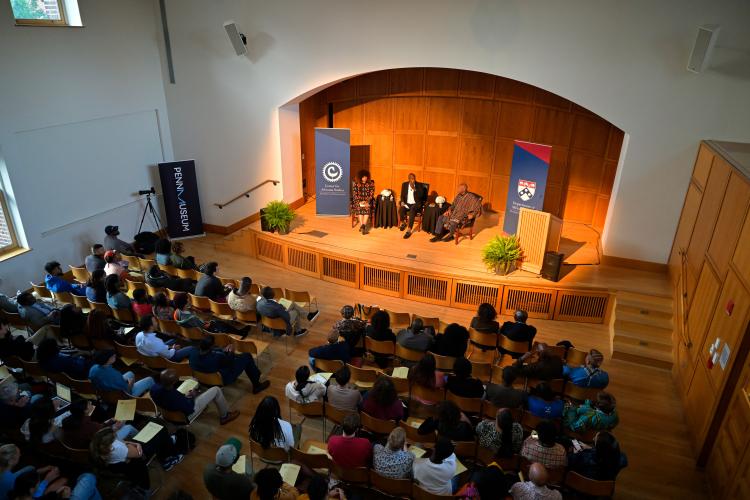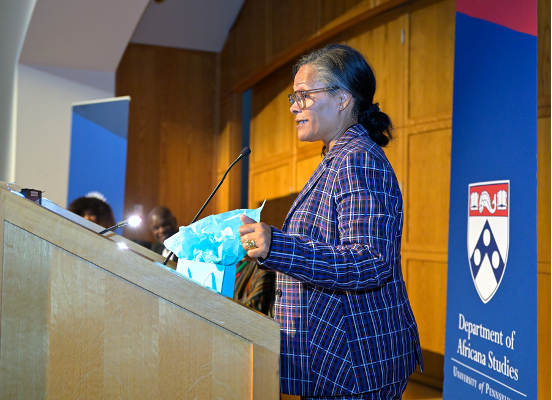
The 50th anniversary of Africana Studies was celebrated on September 18th at the Penn Museum, with a capacity audience of 150 attendees. The focal point of the celebration was a symposium that delved into the history, current state, and future prospects of Africana Studies. Wale Adebanwi, the Director of the Center, opened the celebration by emphasizing the vital role of Africana Studies in higher education.
He highlighted the creation of various ethnic, gender, and diversity departments/programs, which owe their existence to the Black Studies movement—an influential movement that reshaped higher education in America. Adebanwi concluded his remarks by introducing Tukufu Zuberi, the Lasry Professor of Sociology and Africana Studies, who moderated the discussion featuring Professor Molefi Asante from Temple University and Dr. Charisse Burden-Stelly from Wayne State University.

Wale Adebanwi also read the prepared remarks by Professor John L. Jackson Jr., the Provost and a member of the Africana Studies Department and Center. Jackson reflected on Africana's contributions to the university. The Provost underscored that the study of the African diaspora at Penn has a rich history dating back not just 50, but 124 years. He referenced W.E.B. Du Bois’s monumental work, The Philadelphia Negro, a seminal achievement in the field of social sciences. This reference sparked a lively discussion among the panelists.
Molefi Asante, the founding chair of the first doctoral program in African American Studies in the United States and a proponent of ‘Afrocentricity,’ asserted that the Africana project was essential in challenging the dominance of the ‘Pan-European academy.’ He described Temple University’s Africology department, which focuses on methods and theories from a ‘Diopian’ perspective. In doing so, he highlighted Senegalese scholar, Cheikh Anta Diop, as a prime example of someone who turned the Pan-European academy on its head. Asante argued that Du Bois was unable to fully escape the influence of pan- European thought in his work.
Asante’s perspective on Diop and Du Bois shifted the discussion from Africana Studies in isolation and toward a broader exploration of its place in the (study of the) human. Tukufu Zuberi initiated his remarks by suggesting that ‘Africana Studies helps redefine what it means to be human.’ Importantly, Zuberi shared a personal reflection that Africana Studies sought to surpass the conventional boundaries of university education.
He challenged Asante’s characterization of Du Bois, referencing Dusk of Dawn, where Du Bois expressed uncertainty about the future of European civilization.
Charisse Burden-Stelly concluded the discussion by anchoring her responses in the modern struggle for human rights. She cautioned the audience that Africana Studies aimed to break down the physical barriers separating universities from the communities they intend to serve.
Burden-Stelly invoked Walter Rodney's assertion that 'academics are enemies of the people until proven otherwise' and urged Africana scholars to consider the questions they ask and the dialogues they engage in.
The conversation among the three scholars was followed by a Q&A session in which members of the audience asked questions and contributed to the debate.

The celebration concluded with Adebanwi commending his predecessor, Professor Camille Z. Charles, for her outstanding stewardship of the Center and department. In her remarks, Charles credited her success as a faculty member to the invaluable guidance, mentorship, and support she received from senior faculty in Africana Studies, from her time as a tenure-track professor through serving as chair and director.
